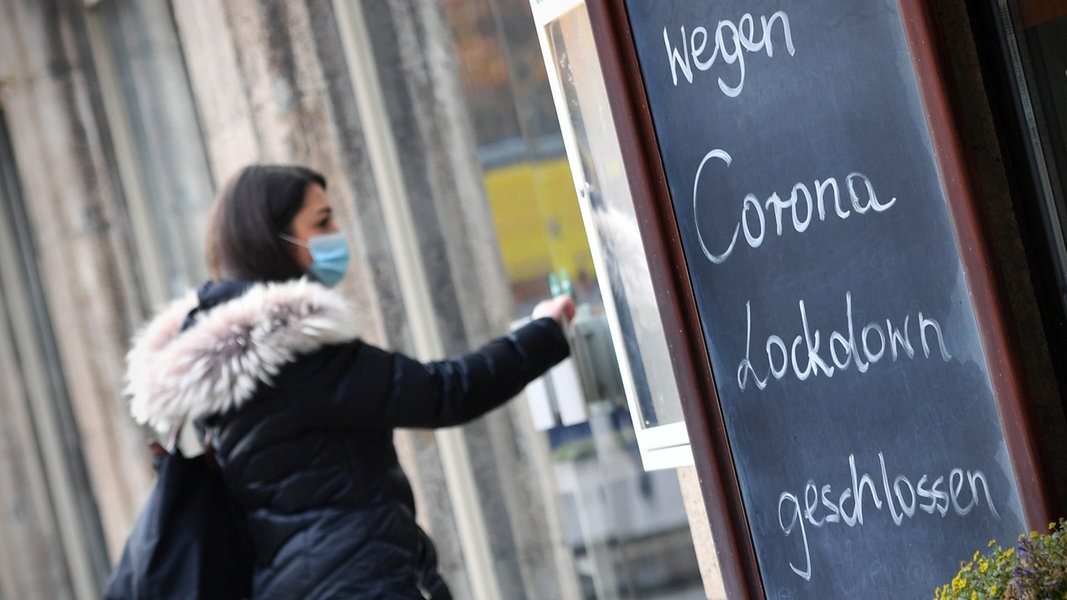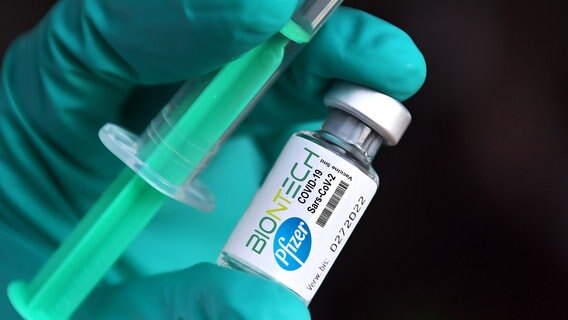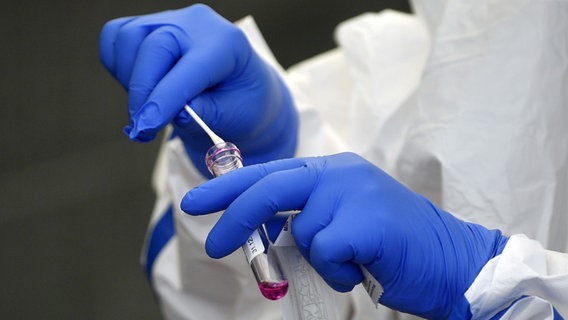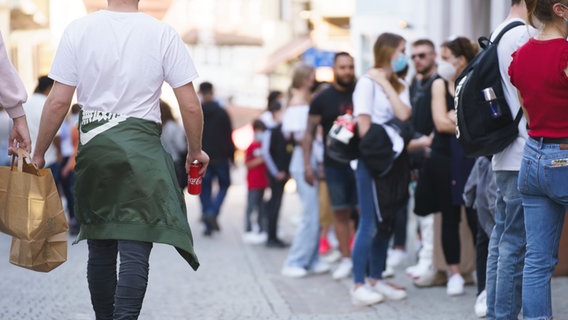The state’s Corona ordinance provides for nightly curfews for municipalities with particularly high incidence values of 150 or more. In individual cases, however, the districts and cities should decide. Because: A night curfew from 9 p.m. does not have to apply to the entire district, but can also be imposed for individual communities or districts. From an incidence of 100, the districts should tighten the corona rules and, for example, expand the mask requirement. It is also possible to be banned from entering public spaces or parks. Since the ordinance came into force, several municipalities in Lower Saxony had issued exit restrictions, but later partially lifted them. The basis for this is a decision by the Lüneburg Higher Administrative Court that declared the relevant regulation for the Hanover region to be unlawful.
–
With a seven-day incidence of over 100, people in a household are allowed to meet with a maximum of one other person. Children up to the age of six can also join. The contact rule for areas below an incidence of 100, however, has changed: Here a household can now meet with two people from another household. The previous rule that a maximum of five people from two households may meet was overturned by the Lower Saxony Higher Administrative Court. If the seven-day incidence in a municipality falls below 35, the relevant district or urban district may allow meetings of up to ten people from a maximum of three households. Children up to and including 14 years are not counted. People from another municipality are only allowed to attend such a meeting if the seven-day incidence there is also below 35. The decisive factor is the number of infections that the State Health Office outputs daily for the municipalities.
–
If a region is below the incidence of 100 for three days in a row, alternate classes continue. If it is above this, with the exception of elementary and special schools and final classes, you go back to distance learning. The Abitur exams should also continue to take place, as requested by Minister of Education Grant Hendrik Tonne (SPD). Pupils must do corona self-tests at home in the morning before classroom lessons.
–
The day-care centers are in limited regular operation. Here, too, the seven-day incidence in the respective municipality must be below 100 on at least three consecutive days. If so, all children are allowed to return to their facilities. The individual groups remain among themselves, however, open concepts are not possible. For tobacco rooms or other rooms that are generally used by several groups, the following applies: Only one group is allowed to stay there at a time. The same applies to the outside area. However, if it is large enough, it can be divided into different groups. If the incidence in a district or an independent city is over 100, the day-care centers continue to offer emergency care for a maximum of half of the children in a group. A maximum of eight children can be cared for in day nurseries and a maximum of 13 children in kindergarten groups. Day mothers and fathers are allowed to continue the care in the already very small groups.
–
When the seven-day incidence in a municipality rises to over 100, the daycare centers switch to emergency care and face-to-face classes are only available for elementary and special needs students and graduating classes. However, this should only take place if the 100 has been exceeded on three consecutive days. In addition, another working day is planned as a buffer so that parents and children can be informed in good time. In addition, those responsible in the districts and urban districts should be able to decide whether, in their opinion, the exceedance of the 100 incidence is permanent.
–
Regardless of the incidence value, lessons in driving and flight schools are possible again. First aid training is also allowed. The same applies to the preparation for the so-called dog driving license and its acceptance. Dog courses, training, exams and character tests are also possible. Face-to-face classes at adult education centers, music schools and other cultural education institutions are still not permitted.
–
All sales outlets with groceries or goods or services for everyday use are open. These include grocery stores, weekly markets, farmer’s shops, beverage stores, health food stores, pick-up and delivery services, baby shops, pharmacies, medical supply stores and drug stores, opticians, hearing aid acousticians, orthopedic shoemakers and orthopedic technology, petrol stations and car washes, motor vehicle dealerships and two-wheelers -, bicycle and electronic device workshops, banks and savings banks, post offices, mail and mail order companies, dry cleaners, laundrettes, newspaper sales outlets, animal supply stores, animal feed trade, flower shops, garden centers and garden centers, fuel and heating trade, sales points for tickets for passenger transport. In addition, regardless of the incidence, there are also the book trade as well as libraries and libraries. Appointments can be made with customers in retail, provided the seven-day incidence in the respective district or an urban district is below 100. A maximum of one customer and an accompanying person are allowed to stay in a 40 square meter sales area. They have to leave their contact details.
–
After the barber shops, cosmetic studios, tattoo studios and massage practices are now allowed to reopen regardless of the incidence value. Practices for physiotherapy, occupational therapy, speech therapy, podiatry and foot care are also open. The same applies to the practices of alternative practitioners. Body-hugging services, for which a medical mask cannot be worn continuously, are only permitted after a previous negative rapid test. An exception applies to speech therapy treatments. Given that children are often treated there, they do not have to be tested.
–
According to a decision by the Lower Saxony Higher Administrative Court, zoos and animal parks are allowed to open regardless of the incidence of their municipality. Memorials, museums, exhibitions and galleries are allowed to open if the seven-day incidence in a district or an urban district is stable below 100 new infections per 100,000 inhabitants. For all facilities, visitors must make an appointment in advance. The facilities may not be more than 50 percent full and must collect and document the data of the visitors.
–
Restaurants, clubs, discos and similar establishments remain closed. The same applies to trade fairs, congresses, commercial exhibitions, special markets, annual markets, theaters, opera houses, concert halls and cultural centers. Cinemas, amusement parks, climbing halls, climbing gardens, climbing parks, play parks, adventure playgrounds, mini golf courses and similar facilities will also remain closed. Amusement arcades, casinos, betting shops and similar facilities will also remain closed. Leisure and amateur sports activities, saunas, thermal baths, swimming pools and fun pools, solariums, fitness studios and prostitution facilities are also not allowed to open for the time being.
–
For children up to and including 14 years of age, sports are again possible in groups of a maximum of 20 participants in the outdoor area of public and private sports facilities. The prerequisite is, however, that the seven-day incidence of a district or an independent city is stable below 100 new infections per 100,000 inhabitants. The sports groups have to be composed of the same participants each time and the participants have to keep their distance from one another. Up to two supervisors can lead the training. Changing rooms and showers may not be used. Adults are allowed to play sports with people in their own household and a maximum of two people in another household. They are also allowed to use public and private sports facilities for this purpose. If the seven-day incidence is below 35, up to ten people from up to three households can play sports together. Children up to the age of 14 are not included in this either.
–
In some areas, proof of a negative Corona test result is mandatory. This applies to so-called body-hugging services when the required medical mask cannot be worn permanently. There, those responsible must offer visitors who cannot prove a PCR or rapid test a self-test. Before entering the facility, this is carried out or supervised by a trained person. In the event of a positive test result, the operator must refuse access and inform the local health department. The person providing the service is also required to test. In homes for the elderly or in need of care, as well as in day care facilities and assisted living facilities, employees and volunteers must take a test before entering. The same applies to visitors and service providers if the seven-day incidence in the relevant district is over 35. People who work in facilities for people with disabilities, in outpatient care facilities, in outpatient care services or in home nursing must carry out a corona test three days a week. Even top athletes have to have themselves tested regularly before practicing non-contact sports. Pupils and teachers should take a quick test twice a week if possible. However, this is not mandatory.
–
In all facilities where visitors, customers or patients meet, it is mandatory to wear a medical mask. These include surgical masks, FFP-2 masks or those with the identification KN95. Breathing masks with an exhalation valve are prohibited. The wearing of the medical masks is compulsory in shops, pharmacies, hairdressers, medical practices, car pools, weekly markets and in all closed rooms of businesses and institutions. In addition, a medical mouth and nose cover must be worn in all parking spaces associated with shops and facilities. Just as in public transport and its associated facilities, such as at stops and in train stations. Children up to and including five years of age do not have to wear a mask at all. Children up to and including 14 years of age are allowed to wear a cloth or everyday mask. Everyone at work must also wear a mask, unless they are at their work place and can keep a sufficient distance from other employees.
Downloads


 –
– –
– –
–
